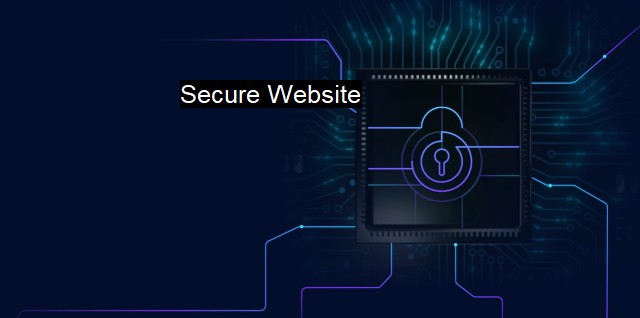What is Secure Website?
The Importance of Secure Websites in Today's Volatile Technology World - Understanding the Need for Encryption and Third-Party Attestation to Protect Confidential Information
A secure website is a website that ensures secure data transmission by encrypting data and utilizing secure protocols such as HTTPS instead of HTTP. The security of a website is a critical aspect that promises safety for internet users from cyber threats, protecting sensitive information like credit card numbers, usernames, passwords, and other personal information. the secure website plays a vital role in thwarting cyber attackers' attempts.When we talk about cybersecurity, the term "secure website" is of paramount importance. This concept revolves around technologies and practices designed to protect networks, equipment, and data from damage, attack, or unauthorized access. In today's hyperconnected world, cybersecurity has been an unshakeable concern for businesses and everyday internet users alike. Cyber attacks can result in data theft, system shutdown, or cause business loss due to reputational damage or resulting lawsuits that such data breaches can ensue.
A secure website implements several measures to deter such attacks. The first such practice is data encryption, which shields data by transforming it into an unreadable code, making it much harder for snoopers to access it. Without the correct decrypting key, this data becomes a random jumble of numbers and letters, worthless to those without access to decryption.
Another common feature of secure websites is the use of Secure Sockets Layer (SSL) or Transport Layer Security (TLS). These cryptographic protocols ensure communication security in a computer network, vital to maintaining the confidentiality and integrity of data in transit between servers and web users. In simpler terms, these protocols create a secure tunnel protected by state-of-the-art cryptographical systems that are impossible for hackers to penetrate.
Beside encryption and secure protocols, secure websites also mandate the use of strong, complex passwords and two-factor authentication. These protective measures add extra layers of security to prevent unauthorized access to users' information.
a crucial component that contributes significantly to a website's security is the integrity and quality of its code. Developers must write code adhering to secure coding practices to avoid susceptibility to intrusions.
In many circumstances, secure websites take up antivirus measures to bolster their security. Given that malware continues to be a considerable weapon in the hands of cybercriminals, such significant protections are warranted. Antivirus software on servers can scan and remove any detected malware, which assists in maintaining website health and the confidentiality of user information.
Secure websites keep their system and security software up-to-date. Consistent system and software updates ensure that the latest security advancements and patches shield essential data, thereby warding off malware and hackers striving to exploit weaknesses in old software.
Secure websites also regularly back up data to avoid a catastrophic data loss outcome from hacking attempts. Not only does this practice provide a safety net from hackers, but it also guards against unforeseen technical setbacks that could inadvertently wipe out significant data.
In being immensely proactive about security, secure websites thoroughly sweep for vulnerabilities and predict potential attack points. Penetration testing or ethical hacking frequently aids in this process by deliberately probing for weaknesses in a system.
a secure website is an intricate combination of secure coding, robust access controls, encryption, reliable protocols, regular system upgrades, antivirus measures, and robust inspections for vulnerabilities. a secure website is the frontline defense against the barrage of cyberattacks escalating in the digital sphere. It crystallizes the essence of the saying, "prevention is better than cure," and accentuates the utmost importance of robust protective measures in the relentlessly evolving digital landscape.

Secure Website FAQs
What is a secure website?
A secure website is one that has implemented measures to protect its users' data and prevent unauthorized access, data breaches, or cyber attacks. It uses encryption, authentication, and other security technologies to safeguard sensitive information that users share on the website.What are some common cybersecurity measures used to secure a website?
Some common cybersecurity measures include installing antivirus and antimalware software, implementing firewalls, conducting regular security audits, enforcing strong passwords, using SSL/TLS certificates for encryption, and implementing two-factor authentication.Why is it important to have a secure website?
Having a secure website is crucial because it protects your users' sensitive information, such as login credentials, personal data, and financial details. A data breach can result in legal and financial repercussions, damage to reputation, and loss of customer trust. Additionally, a secure website is more resistant to cyber attacks, which can compromise the website's integrity and availability.How can I tell if a website is secure?
You can tell if a website is secure by looking for the padlock icon in the address bar, which indicates that the website is using SSL/TLS encryption. You can also check the website's URL, which should begin with "https" instead of "http." Additionally, some web browsers display warnings if a website is deemed unsafe or if the SSL/TLS certificate is invalid or expired.| | A | | | B | | | C | | | D | | | E | | | F | | | G | | | H | | | I | | | J | | | K | | | L | | | M | |
| | N | | | O | | | P | | | Q | | | R | | | S | | | T | | | U | | | V | | | W | | | X | | | Y | | | Z | |
| | 1 | | | 2 | | | 3 | | | 4 | | | 7 | | | 8 | | |||||||